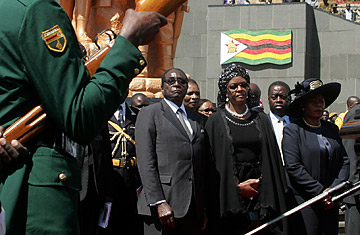
Zimbabwean President Robert Mugabe and his wife Grace attend the burial of Solomon Mujuru, the country's first defense chief and husband of Vice President Joyce Mujuru, in Harare, Zimbabwe, on Aug. 20, 2011
WikiLeaks' release of a cable alleging Zimbabwean President Robert Mugabe is dying of prostate cancer and could be gone by 2013 may have raised eyebrows around the world last week, but it's old news in Zimbabwe. Mugabe's illness has been an "open secret" for many years, says legislator Eddie Cross of the opposition Movement for Democratic Change (MDC). And it is has been officially acknowledged that Mugabe made several medical trips to Malaysia in recent years, although those were always claimed to be for minor ailments. Still, Mugabe has appeared increasingly frail in public, sometimes requiring a golf cart to move around. However public debate about the 87-year-old's condition — like discussion of almost anything to do with Mugabe — has been stifled, Cross says, "because of the atmosphere of fear surrounding Mugabe."
Mugabe's party made a show of denying the allegation in the U.S. diplomatic cable released by WikiLeaks. Zimbabwe African National Union-Patriotic Front (ZANU-PF) spokesperson Rugare Gumbo called it propaganda and insisted that Mugabe "is very healthy [and] will run in the next elections." But nobody's expecting a public response from Mugabe himself.
The cable detailed how the governor of the Reserve Bank of Zimbabwe, Gideon Gono, told then U.S. ambassador James McGee in June 2008 that Mugabe's cancer had metastasized and that doctors gave the President five years to live. Zimbabwean media reported last week that Mugabe was considering sacking Gono, previously one of his closest friends although he allegedly, according to South African media reports, had an affair with Mugabe's wife Grace last year. Both Gono and Mrs. Mugabe strongly denied the allegation.
So how has Mugabe's ailing health affected his rule? In 2008, when Gono and McGee allegedly spoke, Mugabe — who had unleashed his security forces in a political pogrom against the MDC supporters after the opposition party appeared poised to defeat ZANU-PF at the ballot box — unexpectedly agreed to share power with the MDC. But the power-sharing agreement has failed: most government departments are deeply dysfunctional and divided along party political lines, and the economy remains a basket case. Mugabe, in fact, has pushed for an end to the agreement and wants new elections next year.
Sydney Masamvu, senior political analyst at the Idasa, an African democracy institute in South Africa, says Mugabe's illness partly explains his haste to hold a new election. "Mugabe might be incapacitated soon. And without him, there is no chance in hell that ZANU-PF has national standing." Moreover, Masamvu adds, there is "no successor with the necessary clout" to win a majority.
If the WikiLeaks cable allegations are true, how long might Mugabe have to live? "If Mugabe's doctor gave a five-year prognosis, it sounds like the intent is palliative," says Professor Mohamed Haffejee, head of urology at Johannesburg's University of the Witwatersrand, using a medical term for relieving and preventing the suffering of a patient who cannot be cured.
In theory, according to the power-sharing deal, Zimbabwe can only hold a new election once it has adopted a new constitution. The Southern African Development Community (SADC), which brokered the deal, also called for the creation of an independent electoral commission, new voters' rolls, new electoral districts and a supervised, free, fair and transparent poll. ZANU-PF already stands accused of manipulating voters' rolls and electoral districts in its favor, says Cross, and "it will take at least until the end of this year for the new constitution to be adopted." The power-sharing deal mandated a further eight months after that before any elections, meaning the earliest election date is September 2012.
With ZANU-PF support reportedly at an all-time low and a genuinely free and fair election likely to spell doom for the party, members might be tempted to use the security force to stage a sham election. "The hard-liners around Mugabe will go for [elections] with or without SADC approval," says Masamvu. "Such elections will involve violence and vote rigging because ZANU-PF has little popular support left."
